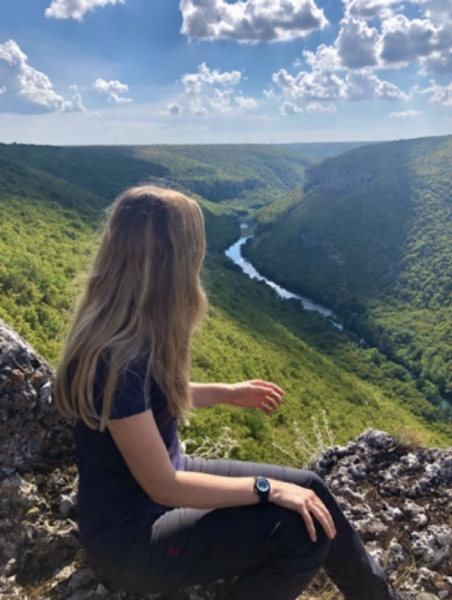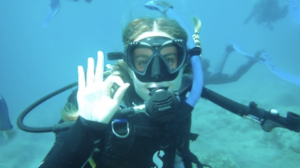
March 30, 2023, by Leah Sharpe
Boosting My Fieldwork Skills In Croatia – A Work Experience Like No Other
By Ellen Blackmore, Environmental Science graduate
Me and my placement:
After completing my MSci degree in Environmental Science, I was lucky enough to spend two weeks volunteering as a Research Assistant with Operation Wallacea in the stunning country of Croatia.
Operation Wallacea is an organisation of academics and field biologists who run biodiversity and conservation management research programmes. They have expedition sites across the world, giving students who join the programme the opportunity to gain invaluable field experience.
I spent the first week in Krka National Park, assisting with data collection alongside different research teams each day. We surveyed a variety of wildlife – such as birds, butterflies, mammals, bats and cave fauna – contributing to the long-term biodiversity monitoring data at the park.
We travelled to Silba Island for the second week, where I had the opportunity to complete my PADI Open Water diving course, as well as receive lectures on Mediterranean marine ecology and survey techniques.
The most memorable part of the trip – bird surveys:
Every day presented something new and exciting, but I have to say the most memorable part for me was holding a bird for the first time. It was a truly unique experience – seeing these beautiful, delicate creatures up close and feeling the warmth of them and their intricately soft feathers in my own hand when they are usually tiny specks high in the sky was amazing.
At dawn, we set up mist nets to catch the birds, and learnt how to ID the species and take measurements such as wing, tail and beak length, how to identify their age and sex, and even how to attach rings to their legs which helps us to understand more about bird migration patterns.
My greatest achievement – diving:
My greatest achievement was that I was able to complete my PADI Open Water Diving qualification. It was much more physically demanding than I anticipated, especially given how exhausted I was after doing both early morning and late-night surveys, and it was the first and only point of the trip where I suddenly felt homesick.
 Every spare moment where we weren’t diving was crammed full of theory revision for the exam. I had to push past my own mental blocks, as I’ve always told myself I’m bad at exams – but I was determined to get my qualification at the end of the week and I did! This means that in the future I can learn more about marine wildlife surveys, as I’m already a qualified diver.
Every spare moment where we weren’t diving was crammed full of theory revision for the exam. I had to push past my own mental blocks, as I’ve always told myself I’m bad at exams – but I was determined to get my qualification at the end of the week and I did! This means that in the future I can learn more about marine wildlife surveys, as I’m already a qualified diver.
Overcoming my biggest challenge:
For me, the trip itself was my biggest challenge. I’d rarely been abroad and never travelled anywhere on my own – everything I’ve ever done has been with a friend or family. Just the thought of it was scary and overwhelming – it was wildly out of my comfort zone, and I went back and forth on whether to sign up for months before finally taking the plunge and committing to it.
It was the best thing I ever did.
I knew I would gain invaluable experience and field skills, but I had no idea how important it would be for my own personal growth to just get out there and do something completely on my own. I made amazing friends, boosted my confidence and independence, discovered what I enjoy within my field, and left seeing a future for myself in environmental science beyond academia.
Would you do anything differently?
I tried my best to throw myself into the experience, learning as much as possible while also allowing time to enjoy myself and take everything in. If you’re considering a placement like this, my main piece of advice would be exactly that – don’t take it too seriously. It’s not university, and the more you enjoy it and get stuck in, the more valuable this experience will be. Nerves are natural, but don’t hold yourself back from such a rewarding, once-in-a-lifetime opportunity. I only wish I’d gone for longer!
How has this experience improved my employment prospects?
I’ve demonstrated both passion and commitment towards environmental science, as well as boosting the range of skills I have developed and putting them into real, important field work. The practical experience I gained is in high demand in the environmental sector, giving me knowledge beyond what the university could teach me and experience I lacked in light of the pandemic.
Previous Post
Connecting Students with RecruitersNext Post
Choosing a Master’s: My TipsNo comments yet, fill out a comment to be the first

Leave a Reply